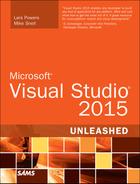- About This eBook
- Title Page
- Copyright Page
- Contents at a Glance
- Table of Contents
- About the Authors
- Dedication
- Acknowledgments
- We Want to Hear from You!
- Reader Services
- Introduction
- Part I: Introducing Visual Studio 2015
- Chapter 1. A Quick Tour of Visual Studio 2015
- Chapter 2. The Visual Studio IDE
- Chapter 3. The .NET Languages
- What’s New in C# 6.0 and VB 14
- Language Primer
- Language Features
- Infer a Variable’s Data Type Based on Assignment
- Create an Object and Initialize Its Values (Object Initializers)
- Define a Collection and Initialize Its Values
- Creating an Instance of a Nonexistent Class
- Add Methods to Existing Classes (Extension Methods)
- Add Business Logic to Generated Code (Partial Methods)
- Access and Query Data Using the .NET Languages
- Write Simple Unnamed Functions Within Your Code (Lambda Expressions)
- Splitting an Assembly Across Multiple Files
- Working with XML Directly Within Your Code (VB Only)
- Removing Unused Arguments from Event Handlers (VB Only)
- Creating an Automatically Implemented Property
- Dropping the Underscore in VB for Line Continuation
- Working with Dynamic Languages/Objects
- Covariance and Contravariance
- Asynchronous Programming
- The .NET Framework
- Summary
- Part II: An In-Depth Look at the IDE
- Chapter 4. Solutions and Projects
- Chapter 5. Browsers and Explorers
- Chapter 6. Introducing the Editors and Designers
- Part III: Working with the Visual Studio Tools
- Chapter 7. Working with Visual Studio’s Productivity Aids
- Chapter 8. Testing Code
- Chapter 9. Refactoring Code
- Chapter 10. Debugging Code
- Chapter 11. Deploying Code
- Chapter 12. Developing Applications in the Cloud with Windows Azure
- Chapter 13. Working with Databases
- Part IV: Extending Visual Studio
- Part V: Building Web Applications
- Chapter 17. Building Modern Websites with ASP.NET 5
- Chapter 18. Using JavaScript and Client-Side Frameworks
- Chapter 19. Building and Consuming Services with Web API and WCF
- Part VI: Building Windows Client Apps
- Chapter 20. Building Windows Forms Applications
- Chapter 21. Building WPF Applications
- Chapter 22. Developing Office Business Applications
- Part VII: Creating Mobile Apps
- Chapter 23. Developing Windows Store Applications
- Chapter 24. Creating Windows Phone Applications
- Chapter 25. Writing Cross-Platform Mobile Applications with Apache Cordova
- Index
- Code Snippets
Language Primer
You have a few language choices available to you as a .NET programmer: Visual Basic, C#, C++, or F# are at the core. There are also user interface (UI)-specific languages and markup syntax, such as JavaScript, HTML, and XAML. Which core language you choose is typically a result of your history, style, and intent. Developers who have worked with past incarnations of Visual Basic or another basic language will find they are at home inside Visual Basic. The language (including templates, tools, wizards, and so on) is all about developer productivity. Developers whose roots are in a C-based language (C++, Java, and so on) and who want similar productivity in a straightforward way gravitate toward C#. Of course, some developers will just want to stay in C++ even for their .NET applications.
Visual Studio 2010 saw the introduction of the F# language. Now part of the full Visual Studio product line, F# 4.0 targets enterprise developers. Similar to other .NET languages, F# supports object-oriented programming. What makes it different is that it is also a functional programming language. Functional programming elevates functions to first-class values. (The F in F# is for functional.) For example, a functional language allows you to easily pass functions as parameters, return functions as the result of a function, chain functions together to create new functions, create recursive functions, and more. These powerful features in F# allow you to more easily tackle complex algorithms with less code (and often less pain) than it would take with the standard object-oriented (OO)-only languages of Visual Basic and C#. Having F# inside of Visual Studio also means that you can leverage the .NET Framework, get the benefits of the Common Language Runtime (CLR) (including calling to and from other .NET code), and have debugging and other related tools support.
Note
F# is both a new language and a new way of programming. You need to spend time to be able to “think” in F#. There is not room in this book to present the language. In addition, most .NET developers still write nearly all their code in Visual Basic or C#. Therefore, we focus on those two languages throughout this book.
-
No Comment
